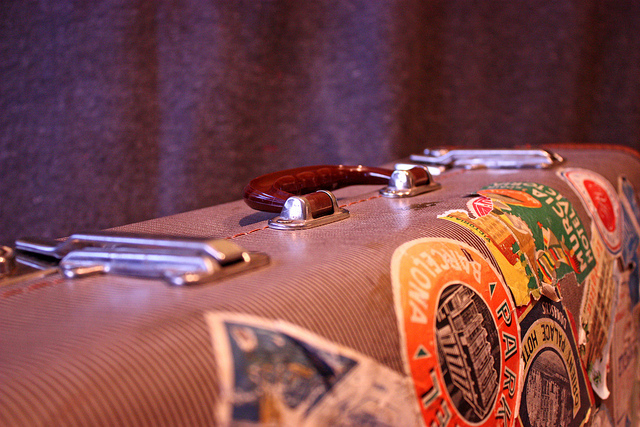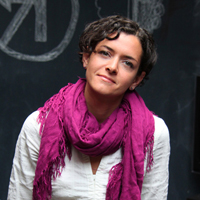A couple of years ago, I was wiping away tears, products from yet another good hard cry, attempting to make myself presentable for a meeting with my friend and mentor.
When we spoke, I shared the news that I was moving to San Francisco for the summer.
I had spent two years wearing a promise ring on my wedding ring finger and planning a future with a man who would eventually end our relationship due to his “financial circumstances.”
Six months later, he disappeared without explanation when I discovered another woman moved in with him.
I had given my complete loyalty and commitment (yes, I was that girl shouting our love from the rooftops) and was left feeling utterly betrayed by someone I had thought was “the one.”
Everything I knew about love, relationships, commitment and getting married had been shattered. I felt the need to start again, re-evaluate and get away from the town where we had built so many memories.
Which brings us back to breaking the news of San Francisco.
Expecting my mentor’s response to be one of celebration for my new beginning and unconditional support, he said, “Just remember Steph, wherever you go, there you are.”
Sometimes changing our environment is the best action to take, but when I heard those words, I learned the importance of knowing the difference between a powerful choice and an escape. My mentor was warning me of the common desire to avoid dealing with ourselves in hope that a change in scenery would eradicate any need to go to the places inside we don’t want to go.
My heart would not (and did not) heal faster in California, and happiness wasn’t waiting there to hand me injections of serotonin when I stepped off the plane 3,000 miles away.
This is exactly what coaches and mentors are for: to tell you what you need to hear, not what your friends and family are conditioned to tell you. This is why they are so effective; they aren’t scared to tell you the truth. In fact, they know that sometimes the most painful insight is the most miraculous.
This insight from my own mentor shifted how I coach my clients, helping them reframe their thoughts, beliefs and actions from the role of passenger to driver.
The “grass is greener” concept is a common epidemic of our society: If you don’t like your job, find a new one; if your lover doesn’t satisfy you, break up with him; if you can’t get along with your family, become estranged from them.
And we move forward, trying on new scenes like a chameleon, but never satisfied, pointing fingers outside of ourselves and forgetting the most important thing: we are the common denominator. We are at the source of our lives, and more importantly of our happiness.
If we look behind us and see that we are leaving a string of disappointments, well, wherever you go, there you are.
If you are unsatisfied with an aspect of your life and considering a big change, acknowledge yourself for taking action as opposed to just being resigned and sticking with what you have. However, keep in mind that many of us operate on “auto-pilot,” a survival mechanism hard-wired in our brain that has us repeat patterns that are simply a version of “flight or fight” and ultimately do not give us the results we truly want.
So, it is important to ask yourself some crucial questions before you move forward.
If you want to go a step deeper, ask these questions of a close friend, mentor or confidante who you know will tell you the hard truth:
Have I been here before?
Knowledge and self-awareness is power. Stand still for a moment and look back at your past to examine other times you were unhappy and took similar action. You want to unveil any repeated patterns that may indicate that you always jump ship when things don’t go your way. If this is the case, your journey may need to be inward, not outward, to uncover what holes you are trying to fill by changing scenes so much.
Is there something I am trying to avoid because it feels too painful to deal with?
Instead of looking for a new environment to fix you, consider a larger shift in context. By looking head-on at what you are dealing with, you can learn to create your future from an empowered place. If you are dealing with a loss or trauma, you may want to focus on healing through therapy, a trained life coach or a reputable personal development program.
What is missing from my situation that I could add that would make a difference?
Sometimes what needs a makeover isn’t our circumstance, it’s us. If you can pinpoint what is missing (i.e. peace, fun, passion), consider how you can fill that space on your own. If peace is missing, could you start meditating? If fun is missing in your job, can you request to be on an exciting project? Look at how you can be at the source of what you say you want. Taking new action is the best way to access new results.
How can I take full responsibility for this situation?
That job you don’t like? Who took the offer? (You). That girlfriend you can’t stand now? Who chose her? (Guess). When we point a finger, three more are pointing at ourselves. Visit with the ugly and dark sides of yourself and get brutally honest. This isn’t ammo to beat ourselves up, this is an opportunity to learn and grow. There is immense power in owning our lives and our choices—especially the ones that didn’t give us the results we wanted.
Ultimately, I chose to stay in this wonderful city indefinitely because of my new commitments to myself, not as a means to run away from the past. I want to be proud of the person who shows up and not afraid of the humanity that goes along with it.
What would it be look like if we could all embrace ourselves instead of running? Often, we avoid this process because we are so scared of what we may learn, anticipating the negative—but at the cost of never seeing our greatness.
So let us learn, dive deep and then arrive boldly, saying with acceptance and self-love, “Wherever I go, there I wonderfully am.”
Love elephant and want to go steady?
Sign up for our (curated) daily and weekly newsletters!
Author: Stephanie Staidle
Editor: Emily Bartran
Photo: elitatt/Flickr












Read 2 comments and reply